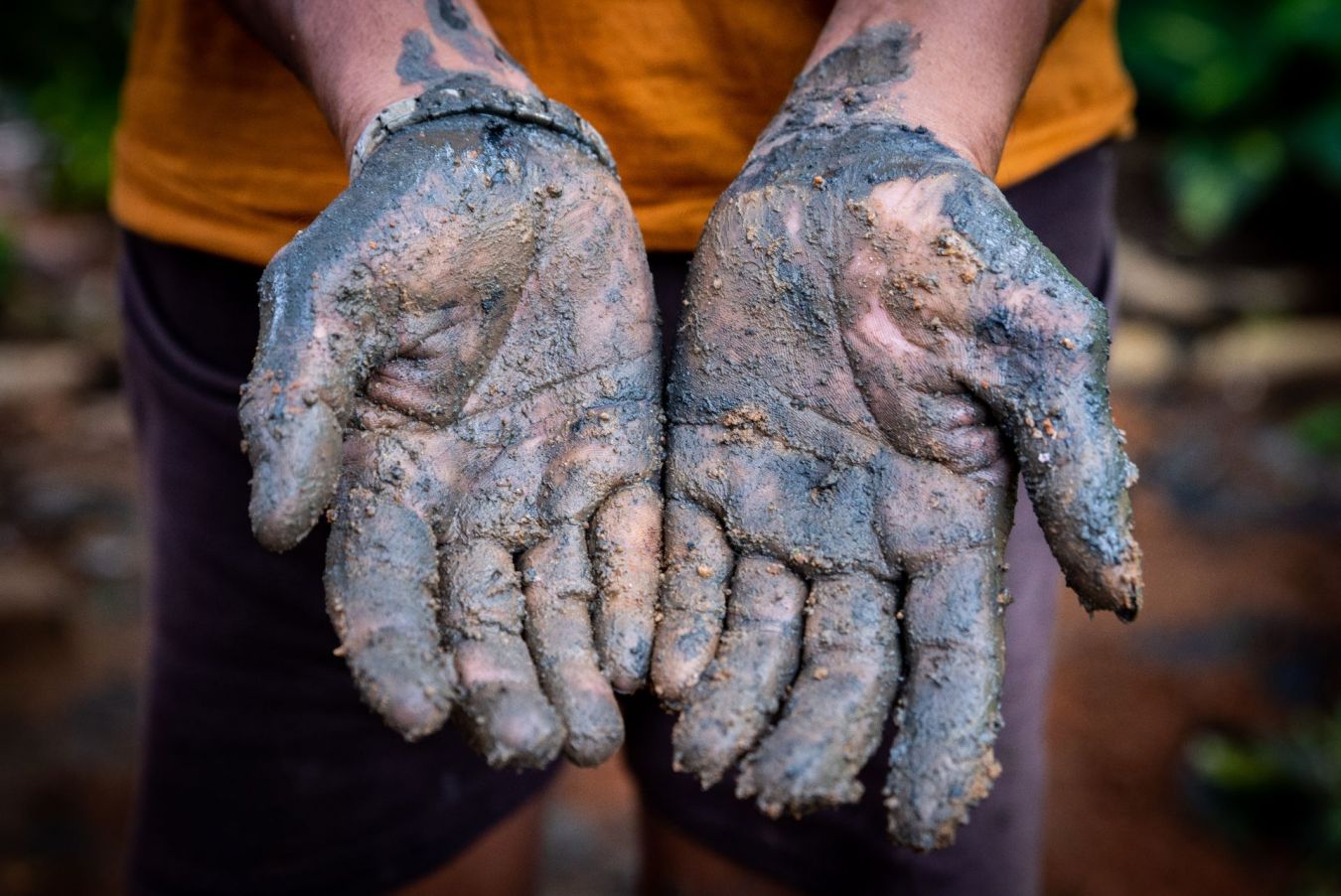
The hands of a sanitation worker after manually emptying a pit, in Bangalore, India.
Image credit: WaterAid/ CS Sharada Prasad/ Safai Karmachari Kavalu Samiti
Sanitation work: Look deeper
Saturday 3rd October, 2020This is a guest article kindly provided by our supporters WaterAid.
In the UK we produce over 11 billion litres of wastewater every day, which is safely transported by either sewers or tankers to around 9000 wastewater treatment works. That is where the wastewater receives extensive treatment before being discharged to inland waters, estuaries and the sea.
Here in the UK, we are fortunate to flush the toilet and not give another thought to how our waste is treated. Although it is hazardous, the treatment processes we use requires little human intervention and workers receive extensive training; they are protected with Personal Protection Equipment (PPE) and they receive free vaccinations against water borne diseases to keep them safe.
But that’s not the whole story. Millions of sanitation workers in the developing world – who clean toilets, empty septic tanks and unblock sewers – are working in conditions that endanger their health and lives. Those emptying latrine pits not only come into direct contact with waste, but the pits can collapse on the workers with devastating consequences. Those entering sewers or big septic tanks without the adequate equipment are at risk of asphyxiation due to toxic gases.
The COVID-19 pandemic has brought about a heightened sense of danger for these sanitation workers.
The hidden workforce
When most countries in South Asia imposed lockdowns to curb the spread of COVID-19, only essential services – including sanitation and waste management – were permitted to continue. This put sanitation workers on the frontlines.
Sita Devi* has been working as a sweeper in the municipality of Lahan in Nepal for 15 years. She recalls the terror in her Dalit community when COVID-19 reached Nepal, and how people started washing their hands more and distancing from each other.
While she appreciates all the precautions people are taking, Sita worries about how much she can protect herself. She worries that she might be contracting the virus from her work and wants to bathe after returning home, to protect her family. However, the community water tap is far from their home, and she often has to rush back to cook the evening meal.
Sita and thousands like her are the hidden workforce that has kept towns and cities functioning during the lockdowns imposed across much of South Asia from March. Despite providing an essential public service, sanitation workers have very limited access to training and protective equipment. They often come from marginalised communities, like the Dalit communities, and their occupation creates further stigma and discrimination.
Not only do people like Sita work in terrible conditions with low pay, but they are also often handling waste manually and with little protective equipment, leaving them highly exposed to risks of injury, infection and even death.
Now is an opportunity for change
The COVID-19 pandemic is a time of heightened awareness, both of our dependence here and across the globe on these key workers for our health, and of the risks they face every day.
It is shocking therefore that although sanitation workers make a key contribution to public health around the world – in doing so, they are forced to work in conditions that endanger their health and lives, with limited protection and almost no formal guidance or support structures.
We need to address the deep-rooted structural inequalities that have relegated them to the margins of society. Also, we will need many more sanitation workers with safe, healthy and dignified working conditions if we are to meet Sustainable Development Goal 6 (SDG6) to bring clean water, decent toilets and good hygiene to everyone, everywhere by 2030.
The stigmas attached to these workers are symptomatic of a wider lack of attention to sanitation. It is not just an issue in countries where WaterAid works – it goes hand in hand with the ‘flush and forget’ culture that we can observe here in the UK. We can live and work at home during the lockdown without worrying about our waste disposal. But the outbreak has revealed the important roles of key workers such as those who work in wastewater treatment.
Unblocktober is a rare opportunity to put their vital roles in the spotlight, and work to further build the recognition and support they deserve.
This Unblocktober, we urge governments to introduce laws and policies that recognise sanitation workers across the globe, that protect their health and safety without social bias. We also urge the UK public to support and celebrate our sanitation workers and to think before you flush.
Explore the lives of sanitation workers in our interactive story feature
*Name has been changed to protect identity

